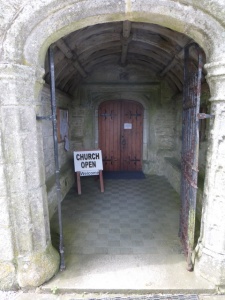Locked churches are one thing but locked churches which do not tell you where you can find the key or which give no indication when the church might be are unhelpful to say the least.
The only locked church we have so far visited where there was any sign that it might be open at some point was Madron. The hours they offered were rather inconvenient, the more so if anyone turned up with Simon Jenkins’ book, expecting to see one of the glories of Cornwall for he gives Madron a star for its atmospheric interior and Nelson memorabilia.
On our list of churches to avoid if you don’t wish to be disappointed are:
- Antony – no sign when, or if, it would ever be opened
- Budock – open on Wednesdays, we were told by a passing local
- Cornelly
- Gulval
- Lamorran
- Launceston St Stephen
- Launceston St Thomas
- Mabe – no sign when it would ever be opened
- Penryn – open in August 2015 but we only discovered this by chance
- Perranarworthal
- Redruth St Euny – no sign when, or if, it would ever be opened
- St Erme
- St John – restoration work in progress (October 2015)
- St Martin by Looe – only open weekdays April-September
- Treslothan
- Whitstone
What are churches for? Are they the vicar’s ‘office’ where he, or one of his team, can be found to provide support. Probably not in today’s world as he/she will be out and about, covering several churches and visiting people or being dragged into the inevitable meetings.
Are they places for individuals to get spiritual comfort? A cathedral that charges takes this seriously and always has a small chapel set aside for prayer. Churches are also places where prayer has been relevant, quiet spaces to commune. Not, it seems in some parishes.
Are they gateways to faith? The famous John Betjeman quote says that ‘it was by looking at churches that I came to believe in the reason why churches were built’. So perhaps they are.
Are they places on the tourism trail? Our purpose in visiting is undeniably an architectural and historical one as we set out on another page. We want to understand the history of the community and to see the building in which it invested its time and money.
But why should the Church of England be required to fund the repair and maintenance of a historic asset?
In some European countries the churches are owned and repaired by the state with the Church being permitted to use them. That is not a solution that would fit well with the British way even though we have an established church. Our solution is to provide grants by Historic England and the like, the majority of churches being Grade 1 Listed Buildings, and those grants bring the requirement to provide access.
Some vicars regard the management of a historic church as a burden which they could willingly avoid, arguing that ‘the church’ is not about the building but the community. A fair comment but not helpful in understanding the importance that building will have played in history or could play in the future.
The usual reasons advanced for keeping a church locked are obvious:
- Fear of bad behaviour: we were told by one person that there were ‘worries’ that people had been engaged in sexual activities which seemed rather unlikely given that the church would have been open to all. They same applies to the holding of anti-Christian ceremonies
- The fear of theft: many churches mark their possessions with hidden ink, other simply put away the brass candlesticks and leave out the wooden ones. who wants to steal a hymn book anyway?
- Problems finding someone to staff the church or to hold the key: this sounds like an excuse. Is a volunteer really necessary all the time and have you actually tired leaving a key at a nearby house?
The reality is probably that hateful word: risk. Nervous, risk-averse, churchwardens don’t want ‘an accident’ to happen on their watch and so opt for the easy option. So much for the ministry of welcome.
Come on vicars and churchwardens: stand up and be counted. Take a risk and show you want people to visit and possibly, just possibly find out more about your faith.

